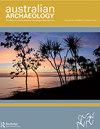Archaeology, deep history and the culture wars: Why most archaeologists have not critiqued Dark Emu
IF 1.2
3区 历史学
Q2 ANTHROPOLOGY
引用次数: 0
Abstract
I guess I must be a glass-half-full person. While recognising the intellectual thrust and many issues raised by this Forum piece and agreeing that few Australian archaeologists have engaged with Dark Emu and its propositions, I don’t think that Dark Emu is a tragedy – either for Aboriginal people – or for the relationship that Australian archaeology has with Aboriginal people. And I take exception to the statement therein that ‘Australian archaeology is also complicit in the erasure of Aboriginal diversity and alterity that is an effect of Dark Emu’s project and, as such, [is] responsible for the erasure of options to learn from the past and challenge the present’. Dark Emu’s significant achievement has been in the popularising of some of the complexities around resilience and persistence of Aboriginal people on this continent – another cog in the History Wars wheel, post the Native Title era – overturning longheld misconceptions about the hapless wandering of ‘mere’ hunter-gatherers which have been promulgated through most Australian’s education over the last 50 (100?) years (or at least since the history curriculum became a talking point). I rejoice in the fact that Australian children and youth are now being taught a different interpretation from that which was taught previously, based on the journals of foundational white explorers of this continent. Our history lessons in the sixties and seventies were focussed on these same explorers – the ‘discoverers’ of this vast continent, after whom many of our rivers and deserts and ranges are still named – despite the fact that many of them failed to survive their journeys, in part because they were dismissive of the Indigenous peoples they encountered – flourishing in the lands they traversed. The fact that it is the writings in these explorers’ journals that Pascoe mobilises in his narrative to demonstrate how firmly Aboriginal people were in place (contra terra nullius), constructing more permanent dwellings, harvesting bountiful seeds in times of plenty (no doubt to support ceremonial aggregations), has been well known to historians for decades. And indeed, Dark Emu builds on more detailed syntheses such as those by Bill Gammage (2011) and Rupert Gerritson (2008) – (see review by Peter Veth, this issue). But not since The First Footprints series (Contact Films 2013) has this type of narration captured the imagination and broader interest of the Australian public. Dark Emu is a history discourse – based on the interpretation of written texts. It engages little with the archaeological evidence which has continued to be generated over the last several decades. Nor, as Sutton and Walshe (2021) have pointed out, does it engage with the entire land rights and Native Title discourse generated by anthropologists over the last 20 years. And I guess therein lies its major flaws. I agree with the view expressed in The Tragedy that we need to consider Aboriginal Australian lifeways in a frame which transcends a debate about the hierarchy of hunter-gatherers and farmers. A knowledge system which enables continuity of cultural tradition through millennia by curating water knowledge in the desert through mythological narratives and multiple symbolic systems (rock art, sand drawing, body painting and sacred objects) is a form of social resilience and persistence which needs to be celebrated (as demonstrated by the Martu regarding exclusive water rights in their Native Title Determination: Martu 1 WAD6110/1998; Jeffery James and Ors on behalf of the Martu People v The State of Western Australia). Pascoe’s reliance on an antiquated hierarchy whereby farming is seen as being a greater pinnacle of human progress and achievement than hunting, gathering and foraging is a widespread problematic (e.g. one which human behavioural ecologists have been struggling with for decades!).考古学,深层历史和文化战争:为什么大多数考古学家没有批评黑暗鸸鹋
我想我一定是一个半满的人。虽然我认识到这篇论坛文章所提出的思想主旨和许多问题,并同意很少有澳大利亚考古学家参与过深色Emu及其主张,但我不认为深色Emu是一场悲剧——无论是对原住民来说,还是对澳大利亚考古与原住民的关系来说。我对其中的说法表示异议,即“澳大利亚考古也参与了对原住民多样性和互变性的抹杀,这是Dark Emu项目的影响,因此,对抹杀从过去学习和挑战现在的选择负有责任”。Dark Emu的重大成就是普及了这片大陆上原住民的韧性和持久性的一些复杂性——这是历史战争车轮上的另一个齿轮,后土著头衔时代——推翻了过去50(100?)年来(或者至少自历史课程成为一个话题以来)大多数澳大利亚人的教育中对“纯粹”狩猎采集者不幸流浪的长期误解。我很高兴澳大利亚的儿童和青年现在被教授了一种与以前不同的解释,这种解释是基于这个大陆的基础白人探险家的期刊。我们在六七十年代的历史课集中在这些探险家身上——这片广袤大陆的“发现者”,我们的许多河流、沙漠和山脉仍然以他们的名字命名——尽管他们中的许多人未能在旅途中幸存下来,部分原因是他们对所遇到的土著人民不屑一顾——他们在所穿越的土地上茁壮成长。几十年来,历史学家们都知道,正是这些探险家日记中的文字,帕斯科在他的叙述中动员起来,来证明原住民是多么稳固(反无主地),建造了更多的永久性住所,在富足的时候收获了丰富的种子(毫无疑问是为了支持仪式性的集会)。事实上,Dark Emu建立在更详细的合成之上,比如Bill Gammage(2011)和Rupert Gerritson(2008)的合成——(见Peter Veth的评论,本期)。但自《第一个脚印》系列(2013年Contact Films)以来,这种类型的叙事从未吸引过澳大利亚公众的想象力和更广泛的兴趣。黑暗的Emu是一种历史话语——基于对书面文本的解读。它几乎没有涉及过去几十年来不断产生的考古证据。正如Sutton和Walshe(2021)所指出的,它也没有涉及人类学家在过去20年中产生的整个土地权利和原住民所有权话语。我想它的主要缺陷就在于此。我同意《悲剧》中表达的观点,即我们需要在一个超越狩猎采集者和农民等级制度辩论的框架内考虑澳大利亚原住民的生活方式。通过神话叙事和多种象征系统(岩画、沙画、人体彩绘和圣物)管理沙漠中的水知识,使文化传统延续数千年的知识体系是一种需要庆祝的社会韧性和持久性(如Martu在其原住民所有权确定中关于专属水权的证明:Martu 1 WAD6110/1998;Jeffery James和Ors代表Martu人民诉西澳大利亚州)。帕斯科对过时等级制度的依赖是一个普遍存在的问题(例如,人类行为生态学家几十年来一直在努力解决这个问题!)。
本文章由计算机程序翻译,如有差异,请以英文原文为准。
求助全文
约1分钟内获得全文
求助全文

 求助内容:
求助内容: 应助结果提醒方式:
应助结果提醒方式:


